Reginald at the Golden Globe Awards
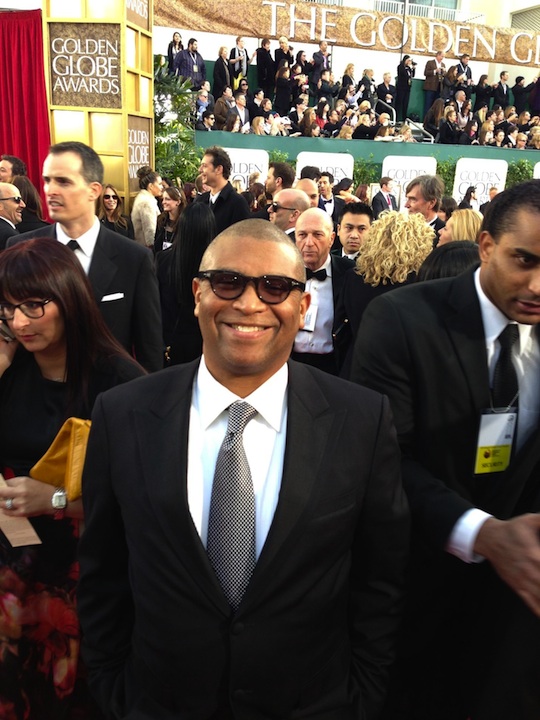


Talk about it on HEF – the Hudlin Entertainment Forum
No Comments + Read MoreThere’s been volumes of analysis of the film from black intellectuals…to switch it up, here’s a take on the film’s political messages from a white guy.
Talk about it on HEF – the Hudlin Entertainment Forum
No Comments + Read MoreDr. Todd Boyd of USC is brilliant on a number of subjects, but I would start recommending you reading his two articles on DJANGO UNCHAINED. Smart, insightful stuff.
Talk about it on HEF – the Hudlin Entertainment Forum
No Comments + Read MoreThis is different clips of me talking about DJANGO that I found online.
Talk about it on HEF – the Hudlin Entertainment Forum
No Comments + Read More
Unrelated to the comic book, here’s a time lapse shot of one of the brothers behind BROTHER MAN comics drawing a sketch of Django.
Talk about it on HEF – the Hudlin Entertainment Forum
No Comments + Read MoreBy Joseph Hughes for Comics Alliance
Reginald Hudlin has worn a lot of hats. He’s been a producer, comic writer, and director, amongst other work. Recently, Hudlin’s applied two of those skills to one project, as both a producer on Quentin Tarantino’s Django Unchained and, as it turns out, the writer who’s adapting the film into a miniseries for DC Comics, along with artist R.M. Guera.
ComicsAlliance had a chance to speak with Hudlin about writing the Django Unchained comic, talking comics with Tarantino, and the very real possibility of Kill Bill someday being adapted as a comic as well.
ComicsAlliance: Talk a bit about how this comic came about. It’s meant to include things that were cut from the final film. What made you, director Quentin Tarantino, and everyone else behind the decision come to the conclusion that a comic adaptation was the right way to tell this story in full?
Reginald Hudlin: Well, it always seemed a little odd to me that Quentin had never done anything in the comic book medium, you know? He’s such a fan, and we spend a lot of time talking about comic books. He likes to publish his screenplays as written, with no photographs, no images, so they kind of stand alone as a piece of literature. But given how many changes we were making to the screenplay while we were making the movie, because we’d say "Oh, this actor has a new idea," or "Quentin has a new idea," or something with the location, and we’d kind of change things around. And then of course with the movie we had to cut a lot of things just to get it to the 2 hours and 45 minutes that it was, so we had to cut a lot of scenes that were our favorite material. So the idea of doing a comic book that had all that original stuff just seemed like a good idea. It seemed like a good extra bonus for readers.
CA: Like you said, Tarantino hasn’t done comics before, and you were surprised by that, but you obviously have.
RH: Yeah, I mean, it’s cool. I’ve done them before, but he’s very comic book literate [laughs]. And the same way that we would spend hours discussing obscure movies and obscure TV shows, we would also discuss obscure comic books. Not just Marvel and DC, but Gold Key, Charlton, Dell, you know. We would go deep in the stacks as we talked about comics [laughs]. So it just seemed crazy to me that he had never done this. So I just said "Look, this is for you, this is your world. You need to be here." And when he was flipping through the pages of the first issue, he was just so happy, and he turned to me and said "I can’t believe we’ve never done this before." And I said "Yeah, can you imagine a Kill Bill comic! That’d be pretty cool."
CA: It’s not too late. I’m just putting that out there…
RH: No, no, it’s not too late! I promised him that going forward we would make sure that this oversight would never happen again. I’ll have to take a hard look at going back to some of those classics and maybe revisiting those as well.
CA: Again, you have experience writing comics, with your run on Marvel’s Black Panther and your work on the graphic novel Birth of a Nation. But this was adapting a screenplay into comic form. How has this experience been different from your previous comic work?
RH: The trick is, you know, when you read a Quentin Tarantino screenplay, you see the movie in your head. That’s one of the reasons why he’s not just a great screenwriter. The prose really sings on the page. So the trick is, he’s writing something incredibly cinematic, and so you’re taking something that’s very cinematic, and you have to translate it into another medium, this comic book medium. And there are certain things you can’t do. When he invokes that camera move in your head, well, you know we don’t quite have camera moves in comics. A character can’t nod his head, so he has to verbalize what he’s saying. You don’t have music and sound effects as tools in your toolbox. But that said, sometimes removing tools from your toolbox can increase your storytelling strength, because you have to say "Okay, well, how do I convey this idea?" So the challenge is exciting.
CA: You’re working with R.M. Guera, a very accomplished artist who previously worked on Scalped, a comic that, like Django Unchained, is partially inspired by Spaghetti Westerns. What’s it been like working with him? Were you familiar with his work before this collaboration?
RH: Oh, absolutely! I’m a huge, huge fan of Scalped. It’s a brilliant comic, brilliantly written and brilliantly drawn. We had a number of artists who were interested in the job, and when [Tarantino] picked Guera I was very excited. I think that having the right artist is a huge part of the job. You can just go "Okay, well, if I’ve got a script by Quentin Tarantino and art by R.M. Guera, there’s very little I can do wrong!" [Laughs].
CA: There’s been a lot of critical and commercial success with the film, but there’s been some controversy behind it as well, due to the violence, the language and the subject matter. Has that in any way shaped how you’ve gone forward in working on the comic?
RH: No. Well, first of all, I was working on the comic while we were still shooting the movie. And secondly, we made the decision really early on to make the comic book be the comic book, which is different from the movie. If anything the idea is that people can read the comic, they can see the movie, they can see what we changed, what we left out, what we kept in, and they can decide for themselves if those choices were good or not. We want people to look at the text and really think about those choices and go "Wow I’m glad they took that out, they didn’t need that," or "Man, I wish they had put that thing in!" That part of the discussion is great.
CA: Your name isn’t in the first issue, and the fact that you’re the one writing the adaption is just coming out now. Was there anything specific behind that decision? Was it just a timing issue?
RH: It was just a crazy time. We were finishing the movie and trying to get the book out, you know, so the last thing I was thinking about was credit! For me, it’s Quentin’s story and it’s Guera’s art, and that’s kind of what was important to me. And the folks at DC said "You know, could we tell people that you’re writing this thing?" [Laughs] And I just said "Okay, if you really want." That really wasn’t what was important to me, but our partners asked and I just said "Sure!"
CA: Have there been scenes you find are easier or more difficult to translate into a comic?
RH: Again, it’s pretty easy. I mean, the thing about this kind of adaptation work is really that you learn a script in an incredibly intimate way. It’s kind of like doing a cover version of someone’s song. You really go "Oh, I see how well this is constructed." And that’s the fun of working on it, particularly after being deep in shooting and revisiting some of those dialogue changes and scenes that were left out. We knew why we had to make cuts – the movie is pretty long even in this version. But it’s great to revisit some of those little scenes and go "Man, this is good stuff. This is really, really good stuff." [Laughs]
CA: Any hints as to what we can expect to see that isn’t in the film?
RH: Well, you know, every actor kind of has some of their favorite moments that have to go away for the greater good of the film. But I know Sam Jackson and Jamie Foxx and Kerry Washingtong and Christoph Waltz all had some of their favorite moments not make it. It’s a shame we don’t get to see all of their magnificent performances because they were great every day all day. But at least you get to see a hint of some of the great work they delivered throughout the filming in some medium. I know Sam is a big comic fan himself. We run into each other at Golden Apple on occasion. And he was one to say "Hurry up and get to my scene!" [Laughs]
CA: I’ve heard Samuel L. Jackson is a comic fan, so did he – or anyone else in the cast – come up to you at any point and say "Hey, I know this got cut, so you better put it in the comic!"
RH: [Laughs] No pressure! But I’m always proud that I’m the guy who told Sam "Go to the store and grab The Ultimates because you’re in it!"
CA: Ha! You were the one who first told him that?
RH: Oh yeah. So, you know, we have a great comic book relationship!
Django Unchained #1 is on sale now in your local comic shop and is available digitally from Comixology. Issue #2 will be available February 13th.
To order a signed copy of the DJANGO UNCHAINED comic book go to www.reggiesworld.com!
Talk about it on HEF – the Hudlin Entertainment Forum
No Comments + Read More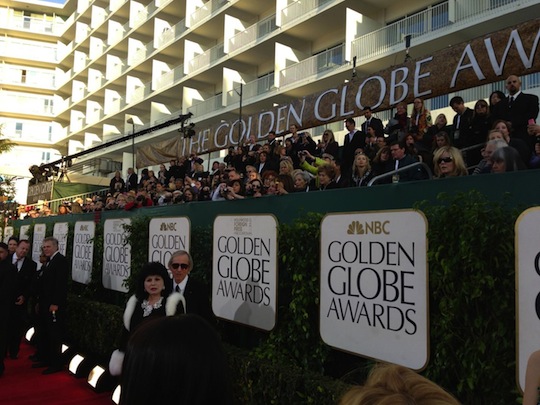
Here’s a little photo essay about our Golden Globes experience.
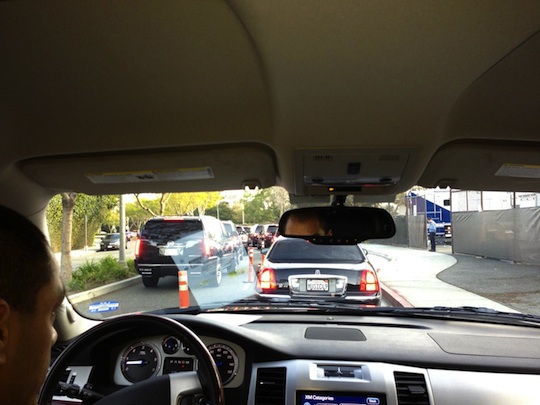
The traffic is incredible. This is a street I zip up and down four times a day, right near my house. Today it’s the only route to the Golden Globes and it takes a half hour to go five blocks.
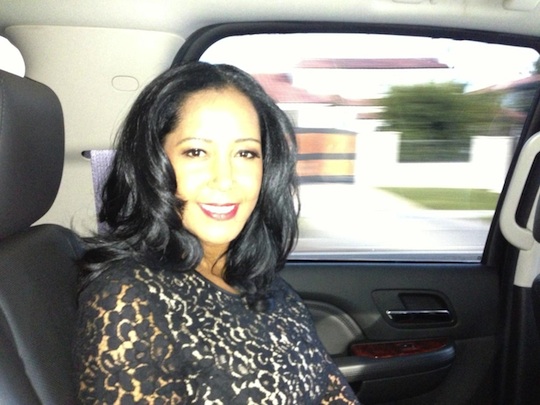
Fortunately my wife looks beautiful. But I can’t tell her because I woke up with no voice that morning. I didn’t really speak to anyone until I hit the red carpet.

Me and my fellow producers Pilar Savone and Stacey Sher inside the room. This is my forth award show this week so even though it’s an incredible array of stars, you’ve partying with them every day so it’s like senior week in high school before graduation.
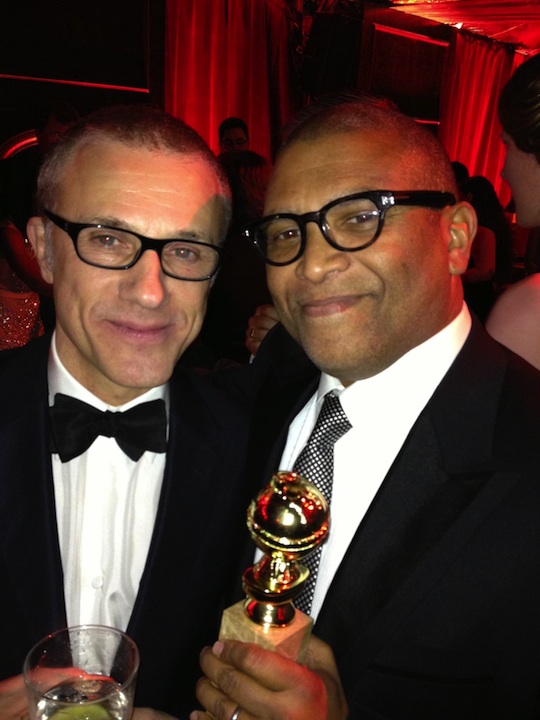
Me and Christoph Waltz at the afterparty later. He insisted I pose with his Golden Globe. Who am I to refuse?
Talk about it on HEF – the Hudlin Entertainment Forum
No Comments + Read More
By Gil Robertson IV for Ebony.com
As a newly minted Academy Award nominee (as one of nine producers on Django Unchained), Reginald Hudlin has once again demonstrated his strength as a creative force in Hollywood. Beginning his career as the director of the classic hip-hop comedy House Party, Hudlin has gone on to showcase his considerable talents by directing other hit films like Boomerang and The Great White Hype, and as a writer and producer for several successful TV shows. A former president of entertainment for BET, the Harvard University graduate has been a consistent power player, widely respected throughout the industry for his commitment to his craft.
EBONY.com recently caught up with Hudlin to discuss his success on Django Unchained and his incredible career.
As a newly minted Academy Award nominee (as one of nine producers on Django Unchained), Reginald Hudlin has once again demonstrated his strength as a creative force in Hollywood. Beginning his career as the director of the classic hip-hop comedy House Party, Hudlin has gone on to showcase his considerable talents by directing other hit films like Boomerang and The Great White Hype, and as a writer and producer for several successful TV shows. A former president of entertainment for BET, the Harvard University graduate has been a consistent power player, widely respected throughout the industry for his commitment to his craft.
EBONY.com recently caught up with Hudlin to discuss his success on Django Unchained and his incredible career.
EBONY: How does it feel to make history as only the fourth African-American to be nominated for an Oscar in the Best Picture category?
Reginald Hudlin: It’s an incredible honor! Hopefully some time soon, there will be so many Black folks nominated in this category that we’ll stop counting.
EBONY: What are your thoughts regarding the various controversies with Django Unchained?
RH: This movie is not only QT’s biggest film, but it is on track to be the most successful Western in movie history. That’s right: a Black Western starring Jamie Foxx. A huge part of that box office success has been Black viewers. They were almost half the audience on opening day, and Black viewers have consistently remained around 30 percent of the box office thus far. So the people are clearly voting with their dollars. To quote Jay-Z, “Men lie, women lie, but numbers don’t lie.”
Our success is clearly more than just people going to see the film. All types of educators, critics, intellectuals, social activists and parents have contacted me in one form or another for helping to make the film happen. Afeni Shakur, Tupac’s mother, has seen it four times. Dick Gregory has seen it 12 times. We never expected to please everybody, but once you remove the distortion effect of the media, it’s pretty clear that we are pleasing most people.
EBONY: How did you get involved with the film?
RH: Quentin and I have been friends for over 15 years. It’s a natural and easy friendship because we are pretty obsessive with our love of pop culture, whether it be film, music or comic books. We also don’t see any division between high and low art. Sometimes the most relevant expressions of pop culture are in mediums or genres that are dismissed by the mainstream, but they end up having a bigger long-term cultural impact.
Over a decade ago, Quentin and I were talking about movies about slavery and I brought up my frustration with most of them. I had no interest in seeing yet another movie about noble suffering. I wanted to see foot to ass. There were all kinds of Black people who stood up and fought back, including members of my own family. I wanted to see stories about them. It was one of many conversations we had about movies, so I didn’t think much of it until April of 2011, when he handed me the script and reminded me of that conversation and how that had been the seed for Django Unchained. There are not a lot of people in Hollywood who would acknowledge that, or bring you on as a producer to help ensure the spirit of the project. But Quentin is a rare individual.
EBONY: Do you have any comments regarding Quentin’s Best Director nomination omission among Oscar voters?
RH: I think everyone on the film did superlative work. I think Quentin is a masterful director as well as a brilliant writer. I think Sharen Davis is an incredible costume designer. I think the original music by John Legend and Jamie Foxx is incredible. I think Jamie Foxx, Leonardo DiCaprio, Kerry Washington and Samuel L. Jackson gave performances that will be remembered in film history. I can go on and on because I feel so proud of my colleagues and so protective of them. But you can’t complain about what you don’t have. I’m very proud of Quentin and Christoph winning Golden Globes, and I hope that’s the start of a trend.
EBONY: What would you say is the takeaway for moviegoers seeing Django?
RH: The film has spurred a national conversation about slavery, which is America’s original sin. It’s a conversation that is long overdue if we as a nation are going to make the most of the 21st century.
The film also tells us that a love story between a Black man and a Black women can have tremendous success at the box office, and that people of all races and ages will support it.
Lastly, the film gives us a kickass Black hero in the spirit of Stagolee and other mythic characters. Django stands in for true-life heroes whose stories may never be told, like my great-great-grandfather, who was a conductor on the Underground Railroad.
Gil Robertson IV is a noted A&E and Black lifestyle journalist, author and producer. President and co-founder of the African-American Film Critics Association (AAFCA), he resides in Los Angeles and Atlanta. Follow the AAFCA on Twitter @theaafca.
Talk about it on HEF – the Hudlin Entertainment Forum
No Comments + Read More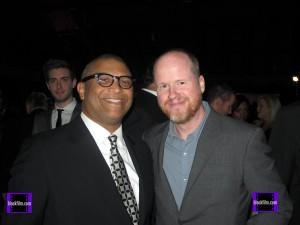
Two Film/TV/Comic book guys in the same place. That is all.
Thanks to Wilson Morales for the picture.
Talk about it on HEF – the Hudlin Entertainment Forum
No Comments + Read More
I love this story for many reasons. Somehow recognition in your hometown means more than the usual story, especially when they actually got the facts right. I love that they got a shot of the Tivoli theater, where I would go and see art films when I was a teenager. The fact that Django is now playing there feels like a victory. Best of all is the interview with Mayor Alvin Parks, who I’ve known all my life, talking about our days in church plays together. I actually forgot we did that together.
Talk about it on HEF – the Hudlin Entertainment Forum
No Comments + Read MoreBy Helena Andrews
Django Unchained sounds like a pretty hard sell. Django (Jamie Foxx), a black slave-turned-superhero, slays every racist dragon in his gun-smoked path? But veteran writer-producer Reginald Hudlin (House Party, The Bernie Mac Show, Boomerang) didn’t so much as blink when his good friend, writer-director Quentin Tarantino, asked him to help bring Django’s story to the big screen. In a conversation with The Root, Hudlin explains why he couldn’t pass up the opportunity.
The Root: How’d you get involved in Django Unchained?
Reginald Hudlin: Quentin and I’ve been friends for a long time. We met, actually, through Pam Grier when they were making Jackie Brown. We got into the conversation, maybe 15 years ago, about movies about slavery. I hated most of them because for the most part they’re about victimology. There’s only one great movie about slavery, Spartacus. Until someone made a movie like that about the American experience, I wasn’t interested. Quentin called me April of last year and reminded me of that conversation we’d had years ago: "Yeah, I’ve written a script. You planted the seed, this is the tree."
TR: So the obviously controversial subject matter, the backdrop of slavery, didn’t give you pause at all.
RH: No, because first of all, part of our problem as Americans — black and white — is that we don’t understand slavery. If you don’t have an understanding of America’s original sin, then we can’t move forward as a people. Jewish people have a saying about the Holocaust, "Never forget," and it serves them very well as a culture. It reminds them that they have to stay sharp so that something like that will never happen again, and it reminds the world of the kind of evil it’s capable of. We need to do the same thing. I’ve been trying to make a movie about the Middle Passage for 20 years and couldn’t get it done.
TR: What made Foxx such a perfect fit for the role?
RH: Jamie’s an incredible actor. He’s from the South. And the fact that Jamie really is a cowboy. When we cast Jamie, we didn’t just cast him; we cast his horse, Cheetah, too. You haven’t seen a combination actor-and-horse casting since Roy Rogers and Trigger. That level of authenticity makes all the difference in a film like this. I mean, he did two takes riding bareback. It was crazy.
His quick-draw skills? There’s no sped-up camera tricks. It’s all him. When you look at Jamie’s work in the movie, between the emotional range of the character from slave to superhero and the physical challenges of the movie, there’s never been a role for a black man as demanding as Django.
TR: According to the Hollywood Reporter, the film makes use of the n-word more than 100 times. Was there a conversation with Tarantino about that?
RH: We knew it was going to be an issue for folks. It was going to be one of many issues for people. But for me, it’s kind of a tempest in a teapot. I’ve yet to talk to anyone who’s seen the film who, after they saw the movie, that’s what they talked about. They talked about the movie. They’re caught up in much bigger issues. As much as the right wing tried to latch on to Jamie as racist because he talked about killing white people, I’ve seen hundreds of white people cheer as Django kills these slave owners, because they’re bad. In that same way, when people see the world of the antebellum South and slavery, "nigger" is the least of their concerns.
There’s every kind of violence in the film, and linguistic violence is the least of it. There’s really been no huge pop-culture event about this period until now. So if this leads to people taking another look at the word, then it’s good. But I hope that’s not the only thing they’re talking about.
TR: Speaking of the violence that far surpassed linguistic violence, there were scenes in the film that were almost impossible to watch. Were you concerned with how much audiences could handle?
RH: I always want to tell people, "Don’t close your eyes; it’s worse because the sound makes it insane." I was, for a short period of time, an African-American-studies major at Harvard, and I felt like a fairly educated person on the subject. I can tell you, whatever you see in the film, there are 10 examples that are 100 times worse.
The balancing act of the filmmaker is to make sure the audience understands slavery is an awful, evil institution, but balance that with how much the audience can take. We told a great story, and part of that was Quentin’s idea of making it a Western where there are clear moral boundaries. You know there’s going to be restitution, and there’s going to be payback. So audiences can engage and cheer in a way that other films on the topic did not allow them to.
TR: Django Unchained has already been nominated for four NAACP awards, including best picture, which was won last by The Help. Are you prepared for some of the same criticisms about black films only winning awards if they depict black actors and actresses as "the help"?
RH: As a people, right now we don’t agree on anything. There’s no consensus. Whether it’s by class, by gender, by region or educational background, black folks are in conflict. We don’t agree that Cosby is a good thing, that Tyler Perry’s a good thing or that Jay-Z’s a good thing. Are there going to be some people who are like, "Nah, I don’t like that"? Sure.
We can’t feel that way. Part of slavery’s history is that we always fought back, and we always stood up. The film is about celebrating the people who did. And hopefully that will make us as a people come to terms with that difficult part of our heritage.
TR: Do you think only certain people should be allowed to tell certain stories?
RH: The person who gets to tell it is the person who gets to tell it. There are no rules. I certainly don’t want to be restricted to only telling stories about black people. I don’t think race necessarily is an inherent advantage. It’s one of many factors that determine whether you’re the right person for the job. Almost no one could get a movie like this made — black, white or otherwise. Out of the five people who could have gotten this done, Quentin’s the only guy who wanted to do it.
TR: Is this a "message film" at all? Is there something you want people to take away from it?
RH: The movie is profound on a lot of levels. It hits on so many issues. There’s many a Ph.D. thesis on deconstructing the semiotics of Django, from class conflicts in the black community, our relationships with sports, white liberalism and black nationalism — the range of topics the film touched upon is extraordinary. People don’t always see all those things because it’s put in an entertainment context. How can it be profound if I’m entertained? I don’t buy in to that worldview.
Helena Andrews is a contributing editor at The Root and author of Bitch Is the New Black, a memoir in essays.
Talk about it on HEF – the Hudlin Entertainment Forum
No Comments + Read More